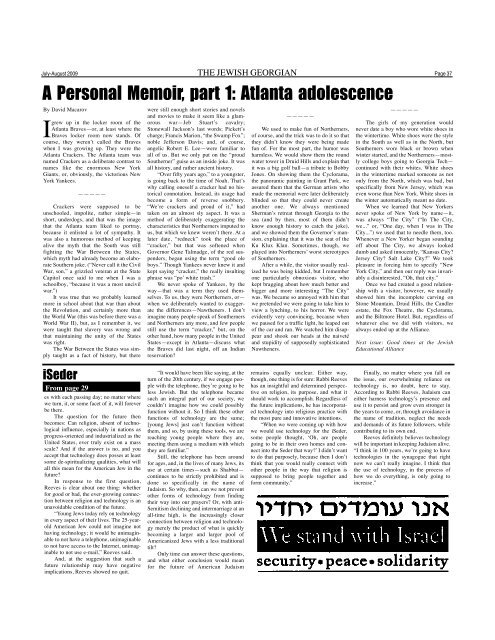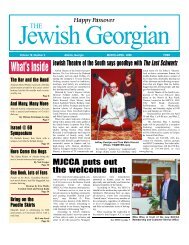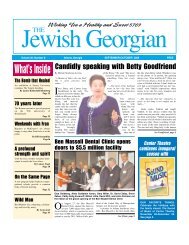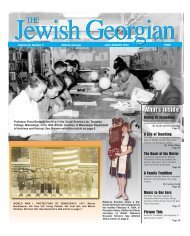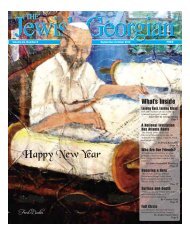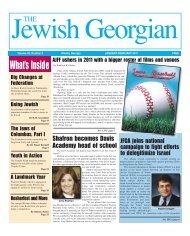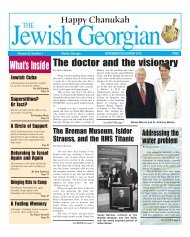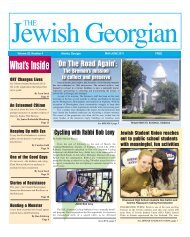JGA July-August 09 - The Jewish Georgian
JGA July-August 09 - The Jewish Georgian
JGA July-August 09 - The Jewish Georgian
You also want an ePaper? Increase the reach of your titles
YUMPU automatically turns print PDFs into web optimized ePapers that Google loves.
<strong>July</strong>-<strong>August</strong> 20<strong>09</strong> THE JEWISH GEORGIAN Page 37<br />
A Personal Memoir, part 1: Atlanta adolescence<br />
By David Macarov<br />
I<br />
grew up in the locker room of the<br />
Atlanta Braves—or, at least where the<br />
Braves locker room now stands. Of<br />
course, they weren’t called the Braves<br />
when I was growing up. <strong>The</strong>y were the<br />
Atlanta Crackers. <strong>The</strong> Atlanta team was<br />
named Crackers as a deliberate contrast to<br />
names like the enormous New York<br />
Giants, or, obviously, the victorious New<br />
York Yankees.<br />
iSeder<br />
From page 29<br />
—————<br />
Crackers were supposed to be<br />
unschooled, impolite, rather simple—in<br />
short, underdogs, and that was the image<br />
that the Atlanta team liked to portray,<br />
because it enlisted a lot of sympathy. It<br />
was also a humorous method of keeping<br />
alive the myth that the South was still<br />
fighting the War Between the States,<br />
which myth had already become an elaborate<br />
Southern joke. (“Never call it the Civil<br />
War, son,” a grizzled veteran at the State<br />
Capitol once said to me when I was a<br />
schoolboy, “because it was a most uncivil<br />
war.”)<br />
It was true that we probably learned<br />
more in school about that war than about<br />
the Revolution, and certainly more than<br />
the World War (this was before there was a<br />
World War II), but, as I remember it, we<br />
were taught that slavery was wrong and<br />
that maintaining the unity of the States<br />
was right.<br />
<strong>The</strong> War Between the States was simply<br />
taught as a fact of history, but there<br />
es with each passing day; no matter where<br />
we turn, it, or some facet of it, will forever<br />
be there.<br />
<strong>The</strong> question for the future then<br />
becomes: Can religion, absent of technological<br />
influence, especially in nations as<br />
progress-oriented and industrialized as the<br />
United States, ever truly exist on a mass<br />
scale? And if the answer is no, and you<br />
accept that technology does posses at least<br />
some de-spiritualizing qualities, what will<br />
all this mean for the American Jew in the<br />
future?<br />
In response to the first question,<br />
Reeves is clear about one thing: whether<br />
for good or bad, the ever-growing connection<br />
between religion and technology is an<br />
unavoidable condition of the future.<br />
“Young Jews today rely on technology<br />
in every aspect of their lives. <strong>The</strong> 25-yearold<br />
American Jew could not imagine not<br />
having technology; it would be unimaginable<br />
to not have a telephone, unimaginable<br />
to not have access to the Internet, unimaginable<br />
to not use e-mail,” Reeves said.<br />
And, at the suggestion that such a<br />
future relationship may have negative<br />
implications, Reeves showed no quit.<br />
were still enough short stories and novels<br />
and movies to make it seem like a glamorous<br />
war—Jeb Stuart’s cavalry;<br />
Stonewall Jackson’s last words; Pickett’s<br />
charge; Francis Marion, “the Swamp Fox”;<br />
noble Jefferson Davis; and, of course,<br />
angelic Robert E. Lee—were familiar to<br />
all of us. But we only put on the “proud<br />
Southerner” guise as an inside joke. It was<br />
all history, and rather ancient history.<br />
“Over fifty years ago,” to a youngster,<br />
is going back to the time of Noah. That’s<br />
why calling oneself a cracker had no historical<br />
connotation. Instead, its usage had<br />
become a form of reverse snobbery.<br />
“We’re crackers and proud of it,” had<br />
taken on an almost sly aspect. It was a<br />
method of deliberately exaggerating the<br />
characteristics that Northerners imputed to<br />
us, but which we knew weren’t there. At a<br />
later date, “redneck” took the place of<br />
“cracker,” but that was softened when<br />
Governor Gene Talmadge, of the red suspenders,<br />
began using the term “good ole<br />
boys.” Though Yankees never knew it and<br />
kept saying “cracker,” the really insulting<br />
phrase was “po’ white trash.”<br />
We never spoke of Yankees, by the<br />
way—that was a term they used themselves.<br />
To us, they were Northerners, or—<br />
when we deliberately wanted to exaggerate<br />
the differences—Nawtheners. I don’t<br />
imagine many people speak of Southerners<br />
and Northerners any more, and few people<br />
still use the term “cracker,” but, on the<br />
other hand, how many people in the United<br />
States—except in Atlanta—discuss what<br />
the Braves did last night, off an Indian<br />
reservation?<br />
“It would have been like saying, at the<br />
turn of the 20th century, if we engage people<br />
with the telephone, they’re going to be<br />
less <strong>Jewish</strong>. But the telephone became<br />
such an integral part of our society, we<br />
couldn’t imagine how we could possibly<br />
function without it. So I think these other<br />
functions of technology are the same;<br />
[young Jews] just can’t function without<br />
them, and so, by using these tools, we are<br />
reaching young people where they are,<br />
meeting them using a medium with which<br />
they are familiar.”<br />
Still, the telephone has been around<br />
for ages, and, in the lives of many Jews, its<br />
use at certain times—such as Shabbat—<br />
continues to be strictly prohibited and is<br />
done so specifically in the name of<br />
Judaism. So why, then, can we not prevent<br />
other forms of technology from finding<br />
their way into our prayers? Or, with anti-<br />
Semitism declining and intermarriage at an<br />
all-time high, is the increasingly closer<br />
connection between religion and technology<br />
merely the product of what is quickly<br />
becoming a larger and larger pool of<br />
Americanized Jews with a less traditional<br />
tilt?<br />
Only time can answer these questions,<br />
and what either conclusion would mean<br />
for the future of American Judaism<br />
—————<br />
We used to make fun of Northerners,<br />
of course, and the trick was to do it so that<br />
they didn’t know they were being made<br />
fun of. For the most part, the humor was<br />
harmless. We would show them the round<br />
water tower in Druid Hills and explain that<br />
it was a big golf ball—a tribute to Bobby<br />
Jones. On showing them the Cyclorama,<br />
the panoramic painting in Grant Park, we<br />
assured them that the German artists who<br />
made the memorial were later deliberately<br />
blinded so that they could never create<br />
another one. We always mentioned<br />
Sherman’s retreat through Georgia to the<br />
sea (and by then, most of them didn’t<br />
know enough history to catch the joke),<br />
and we showed them the Governor’s mansion,<br />
explaining that it was the seat of the<br />
Ku Klux Klan. Sometimes, though, we<br />
played into Northerners’ worst stereotypes<br />
of Southerners.<br />
After a while, the visitor usually realized<br />
he was being kidded, but I remember<br />
one particularly obnoxious visitor, who<br />
kept bragging about how much better and<br />
bigger and more interesting “<strong>The</strong> City”<br />
was. We became so annoyed with him that<br />
we pretended we were going to take him to<br />
view a lynching, to his horror. We were<br />
evidently very convincing, because when<br />
we paused for a traffic light, he leaped out<br />
of the car and ran. We watched him disappear<br />
and shook our heads at the naiveté<br />
and stupidity of supposedly sophisticated<br />
Nawtheners.<br />
remains equally unclear. Either way,<br />
though, one thing is for sure: Rabbi Reeves<br />
has an insightful and determined perspective<br />
on religion, its purpose, and what it<br />
should work to accomplish. Regardless of<br />
the future implications, he has incorporated<br />
technology into religious practice with<br />
the most pure and innovative intentions.<br />
“When we were coming up with how<br />
we would use technology for the iSeder,<br />
some people thought, ‘Oh, are people<br />
going to be in their own homes and connect<br />
into the Seder that way?’ I didn’t want<br />
to do that purposely, because then I don’t<br />
think that you would really connect with<br />
other people in the way that religion is<br />
supposed to bring people together and<br />
form community.”<br />
—————<br />
<strong>The</strong> girls of my generation would<br />
never date a boy who wore white shoes in<br />
the wintertime. White shoes were the style<br />
in the South as well as in the North, but<br />
Southerners wore black or brown when<br />
winter started, and the Northerners—mostly<br />
college boys going to Georgia Tech—<br />
continued with their whites. White shoes<br />
in the wintertime marked someone as not<br />
only from the North, which was bad, but<br />
specifically from New Jersey, which was<br />
even worse than New York. White shoes in<br />
the winter automatically meant no date.<br />
When we learned that New Yorkers<br />
never spoke of New York by name—it,<br />
was always “<strong>The</strong> City” (“In <strong>The</strong> City,<br />
we...” or, “One day, when I was in <strong>The</strong><br />
City...”) we used that to needle them, too.<br />
Whenever a New Yorker began sounding<br />
off about <strong>The</strong> City, we always looked<br />
dumb and asked innocently, “Kansas City?<br />
Jersey City? Salt Lake City?” We took<br />
pleasure in forcing him to specify “New<br />
York City,” and then our reply was invariably<br />
a disinterested, “Oh, that city.”<br />
Once we had created a good relationship<br />
with a visitor, however, we usually<br />
showed him the incomplete carving on<br />
Stone Mountain, Druid Hills, the Candler<br />
estate, the Fox <strong>The</strong>atre, the Cyclorama,<br />
and the Biltmore Hotel. But, regardless of<br />
whatever else we did with visitors, we<br />
always ended up at the Alliance.<br />
Next issue: Good times at the <strong>Jewish</strong><br />
Educational Alliance<br />
Finally, no matter where you fall on<br />
the issue, our overwhelming reliance on<br />
technology is, no doubt, here to stay.<br />
According to Rabbi Reeves, Judaism can<br />
either harness technology’s presence and<br />
use it to persist and grow even stronger in<br />
the years to come, or, through avoidance in<br />
the name of tradition, neglect the needs<br />
and demands of its future followers, while<br />
contributing to its own end.<br />
Reeves definitely believes technology<br />
will be important in keeping Judaism alive.<br />
“I think in 100 years, we’re going to have<br />
technologies in the synagogue that right<br />
now we can’t really imagine. I think that<br />
the use of technology, in the process of<br />
how we do everything, is only going to<br />
increase.”


